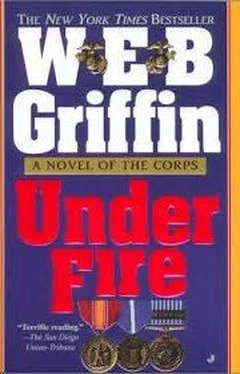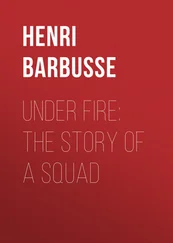Griffin W.E.B. - The Corps 09 - Under Fire
Здесь есть возможность читать онлайн «Griffin W.E.B. - The Corps 09 - Under Fire» весь текст электронной книги совершенно бесплатно (целиком полную версию без сокращений). В некоторых случаях можно слушать аудио, скачать через торрент в формате fb2 и присутствует краткое содержание. Год выпуска: 0101, Жанр: Старинная литература, на английском языке. Описание произведения, (предисловие) а так же отзывы посетителей доступны на портале библиотеки ЛибКат.
- Название:The Corps 09 - Under Fire
- Автор:
- Жанр:
- Год:0101
- ISBN:нет данных
- Рейтинг книги:5 / 5. Голосов: 1
-
Избранное:Добавить в избранное
- Отзывы:
-
Ваша оценка:
- 100
- 1
- 2
- 3
- 4
- 5
The Corps 09 - Under Fire: краткое содержание, описание и аннотация
Предлагаем к чтению аннотацию, описание, краткое содержание или предисловие (зависит от того, что написал сам автор книги «The Corps 09 - Under Fire»). Если вы не нашли необходимую информацию о книге — напишите в комментариях, мы постараемся отыскать её.
The Corps 09 - Under Fire — читать онлайн бесплатно полную книгу (весь текст) целиком
Ниже представлен текст книги, разбитый по страницам. Система сохранения места последней прочитанной страницы, позволяет с удобством читать онлайн бесплатно книгу «The Corps 09 - Under Fire», без необходимости каждый раз заново искать на чём Вы остановились. Поставьте закладку, и сможете в любой момент перейти на страницу, на которой закончили чтение.
Интервал:
Закладка:
"Aye, aye, sir."
"I'll go, too," Banning said.
"I wish I had the time," General Dawkins said. "But..." He put out his hand to Hart. "My compliments to General Pickering, Hart. And good luck."
Chapter Eleven
[ONE]
COMMUNICATIONS CENTER
EIGHTH UNITED STATES ARMY (REAR)
PUSAN, KOREA
0730 2 AUGUST 1950
Master Sergeant Paul T. Keller, twenty-nine years old, had been drafted into the U.S. Army almost immediately upon graduation from high school in June of 1942. After basic training, he had been trained as a high-speed radio opera-tor, and had been assigned to Major General I. D. White's 2nd Armored "Hell on Wheels" Division, ending up the war as a technical sergeant on the banks of the Elbe.
A recruiter had argued that if he went home now-as his points entitled him to-and got out, he was going to find himself just one more ex-GI looking for a job. On the other hand, if he reenlisted, he would immediately be promoted to master sergeant. Moreover, he could go home by air-in-stead of on a troop ship-and go on a sixty-day reenlistment leave. After that, he could have his choice of both any course he wanted to attend at the Army Signal School at Fort Monmouth, and any post, camp, or station in the United States or around the world.
Midway through his leave, Master Sergeant Keller elected to attend the Cryptographic School. He didn't know the first thing about cryptography, except what he'd seen in the movies, and had never heard of the Army Secu-rity Agency, but it sounded interesting-even exciting- and he'd had enough of supervising a room full of radio operators sitting at typewriters with cans on their ears. And he suspected that Germany was going to be a good place to be stationed, now that the war was over.
Orders came assigning him to the Army Security Agency, and his parents and brother told him the FBI had been asking questions of everybody about him, "in con-nection with a high-level security clearance."
The clearance-Top Secret, Cryptographic I-came through when he was at Fort Monmouth taking Phase I of the course. By then he'd learned once you were in the ASA, had been granted the clearance, you stayed in the ASA. That meant that although he would be in Germany, he wouldn't be assigned there. He would be assigned to the ASA Head-quarters, in Vint Hill Farms Station, Virginia, outside Wash-ington, with "duty station wherever."
It turned out that he had a flair for cryptography. After be-ing the honor graduate of Phase II of the course, at Vint Hill Farms, he was sent to work at Headquarters, U.S. Forces, European Theater, in the Farben Building in Frankfurt, Ger-many. After two months there, the ASA changed his "duty assignment" to "Crypto NCO for the U.S. Element, Allied Commandatura, Berlin."
That was really good duty. He had his own apartment, and there were none of the annoying details usually associ-ated with Army life, standing formations, pulling staff duty NCO, that sort of thing. All he had to do was let them know where he was twenty-four hours a day in case something hot had to go out, or came in.
And the Berlin girls were beautiful. So beautiful that he really had to take care not to fall for one of them. The CIC kept a close eye on everybody in the ASA and especially on crypto people. Keller didn't know if it was true, but the CIC thought the Russians were using good-looking frauleins to put ASA/Crypto people in compromising posi-tions. If it looked to the CIC that you were getting too close to a fraulein, you got your security clearance jerked-by then his clearance was Top Secret/Crypto IV, which meant he was cleared to en- and decrypt anything-and losing that meant it would be back to some radio room.
The ASA assigned him temporary duty stations all over Europe-Vienna, Budapest, Moscow-filling in for other crypto people on leave or sick or whatever.
He was really unhappy when in late 1949, the ASA called him back to Vint Hill Farms to be an instructor. But even that proved to be very good duty. It was a good place to be stationed, near Washington, and he could go home to Philadelphia just about whenever he wanted.
Two weeks before, the First Soldier had called him in. With a five-day delay-en-route leave, he was to report to the transportation officer, Fort Lewis, Washington, for fur-ther shipment by air to Headquarters, Eighth United States Army, which had an urgent priority for crypto people.
This was not like Frankfurt or Berlin. They took him from the airport outside Tokyo, to Camp Drake, where they took his personal possessions from him for storage, and is-sued him two sets of fatigues, field gear, combat boots, and an Ml Garand, the first one he'd held in his hands since 1943. And then put him on another airplane the same day and flew him to K-l, the airport outside Pusan.
He quickly learned the Eighth Army (Rear) really did have "an urgent need" for crypto people. Things were fucked up beyond description. When he got there, he saw that Operational Immediate messages, which were supposed to get encrypted and transmitted right then, took hours- even days-to get out.
It would take him a couple of days to straighten things out, but he knew he could do it.
It was going to be a lousy assignment, living in a god-damn tent, sleeping on a no-mattress cot, eating off stainless-steel trays, taking a crap in a wooden-holer GI outhouse, but that's the way it was. It was payback, he de-cided philosophically, for all the good times.
The first thing he did was get rid of the Garand. Crypto centers needed to be protected, sure, but not by the NCOIC carrying a Garand. There were guards on the door, armed with Thompson submachine guns. Keller got a Thompson for himself, plus a.45 pistol.
The second thing he did to speed things up was to get the signal officer to agree that since Operational Immediates-and for that matter, Urgents-should really get im-mediate encryption and transmission, the authority to classify messages should be restricted to officers senior enough to know what an Operational Immediate really was. Henceforth, the signal officer agreed, Operational Immediates would require the signature of a full bull colonel, or better, and Urgents, the signature of at least a light colonel.
Within twenty-four hours-once the backlog had been cleared-Operational Immediates and Urgents were going out in minutes. Which meant that before senior officers had started to sign off on them, most of the messages with that priority really shouldn't have been Operational Immediate and Urgent.
Master Sergeant Keller was surprised when the door opened and two Marines came in. After a moment, he saw that one of them had captain's bars painted in black on the collar points of his fatigue jacket. He remembered that the Marines called fatigues "utilities." The other one had metal warrant officer's bars pinned on his collar points.
Keller knew the 1st Provisional Marine Brigade was coming to Pusan-he had personally decrypted the Top Secret Urgent from the convoy commander, saying when they would arrive, and the reply from the Marine general saying they should be prepared to get off the ships ready to fight-but they'd been scheduled to arrive in thirty min-utes.
And these two looked like they'd been in Korea for weeks, and up with the infantry, not as if they'd just gotten off a ship. They were sweat-soaked, looked tired, and the captain had a Garand slung from his shoulder, with two spare clips clipped on the strap. Grenades bulged in the warrant officer's pockets.
Whenever they'd gotten here, they should not be in here. What the hell's the matter with the guards?
"Good morning, Sergeant," the captain said.
"Good morning, sir," Master Sergeant Keller replied. "Sir, you really shouldn't be in here. How'd you get in?"
"Through the door," the captain replied, somewhat sar-castically. "I just want to use the landline."
Читать дальшеИнтервал:
Закладка:
Похожие книги на «The Corps 09 - Under Fire»
Представляем Вашему вниманию похожие книги на «The Corps 09 - Under Fire» списком для выбора. Мы отобрали схожую по названию и смыслу литературу в надежде предоставить читателям больше вариантов отыскать новые, интересные, ещё непрочитанные произведения.
Обсуждение, отзывы о книге «The Corps 09 - Under Fire» и просто собственные мнения читателей. Оставьте ваши комментарии, напишите, что Вы думаете о произведении, его смысле или главных героях. Укажите что конкретно понравилось, а что нет, и почему Вы так считаете.










